Investigador del ESOC expuso en Oxford su innovador estudio sobre crisis de deuda estudiantil en Chile
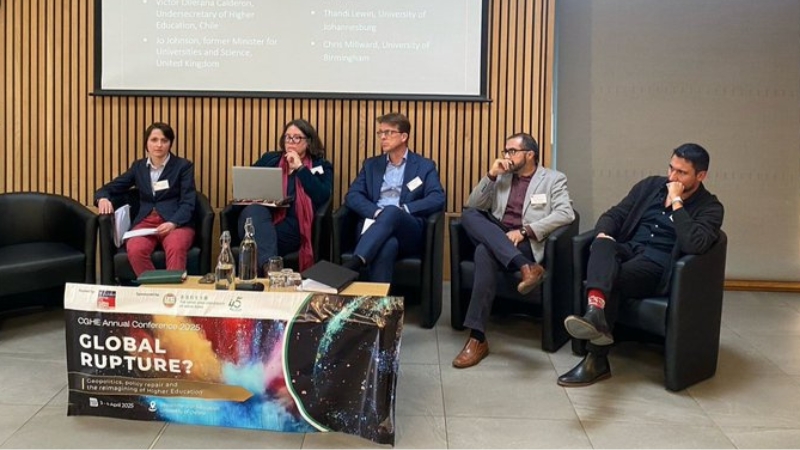
Héctor Ríos Jara presentó su estudio sobre la crisis del endeudamiento universitario en Chile y participó en un panel junto a autoridades y expertos internacionales en educación superior, destacando las reformas chilenas como innovaciones relevantes en materia de financiamiento a la educación superior. El investigador del Centro de Investigación en Economía y Sociedad (ESOC) de la Universidad Central, participó en la décima conferencia anual del Global Center for Higher Education (GCHE), titulada “Rupture? Geopolitics, policy repair and the reimagining of Higher Education” (¿Ruptura? Geopolítica, reparación de políticas y la reimaginación de la Educación Superior.), realizada en el Departamento de Educación de la Universidad de Oxford, Reino Unido. Durante la actividad, el académico presentó el paper “What to do with student debt? The student loan ‘crisis’ and its policy alternatives in contemporary Chile” (¿Qué hacer con la deuda estudiantil? La ‘crisis’ del crédito estudiantil y sus alternativas políticas en el Chile contemporáneo.), que analiza el sistema de créditos universitarios en Chile, sus recientes transformaciones y los debates actuales sobre la condonación de la deuda y el Nuevo Instrumento de Financiamiento a la Educación Superior (FES). La investigación pone énfasis en los efectos sociales del endeudamiento estudiantil, su impacto en la movilidad y cohesión social del país, y cómo las reformas en curso podrían posicionar a Chile como referente internacional en esta materia. El investigador también fue parte del panel sobre financiamiento estudiantil organizado por la Student Funding Network del GCHE, instancia en la que compartió espacio con destacadas figuras del ámbito académico y político internacional. En el panel participaron el Subsecretario de Educación Superior de Chile, Dr. Víctor Orellana Calderón, el Exministro de Universidades del Reino Unido, Jo Johnson, y reconocidos expertos en educación superior como Simon Marginson, Tristan McCowan y Helen Carrasco. “El encuentro permitió conocer las principales tendencias globales en financiamiento de la educación superior, en un contexto de profundos cambios geopolíticos. Las reformas que se discuten hoy en Chile, como la condonación de la deuda, están siendo observadas por la comunidad internacional como políticas de vanguardia”, señaló Ríos. Su participación no solo permitió visibilizar la experiencia chilena, sino también conocer en primera persona los grandes desafíos y tendencias que enfrenta la educación superior en el mundo, en un contexto de profundos cambios políticos y sociales. “La reforma al sistema de crédito y el plan de condonación son temas que están marcando pauta a nivel global”, destacó el investigador. “Lo que está pasando en Chile no solo es importante para nuestro país, también aporta al debate internacional sobre cómo mejorar el acceso y el financiamiento a la educación superior sin que las familias se endeuden por años” agregó.
Gabriel Chouhy publica artículo sobre memoria histórica y el Golpe de Estado en la revista Atenea

El investigador del Centro de Investigación en Economía y Sociedad (ESOC) de la Universidad Central, Gabriel Chouhy, publicó un artículo en la reconocida revista Atenea de la Universidad de Concepción, donde propone una reflexión crítica sobre la memoria histórica en torno al Golpe de Estado del 11 de septiembre de 1973. En su trabajo, Chouhy cuestiona la idea instalada de que el quiebre institucional en Chile fue inevitable. Por el contrario, plantea que el golpe fue una respuesta frente al avance hacia una democracia más inclusiva que ya se había iniciado antes del gobierno de la Unidad Popular. “No se trata de un debate escolástico”, sostiene, “sino de una invitación a cuestionar por qué, en el caso chileno, el avance hacia una democracia más inclusiva iniciado mucho antes de la victoria de la Unidad Popular era visto como una amenaza y no como una oportunidad”. Desde una perspectiva comparada con otros procesos latinoamericanos, el investigador afirma que, aunque los golpes de Estado fueron comunes en la región durante la Guerra Fría, Chile fue el único país donde estos hechos estuvieron precedidos por un experimento democrático de izquierda. “El miedo a que la ampliación de la democracia amenazara las fuentes del privilegio era muy real para las clases acomodadas”, señala, precisando que ese proceso no comenzó con Salvador Allende, sino durante el gobierno de la Democracia Cristiana. En su conclusión, Chouhy plantea que el golpe no fue un desenlace inevitable, sino una decisión política tomada por sectores que se sintieron amenazados ante la posibilidad de una democracia más igualitaria. “Los septiembres de ayer son los octubres de hoy”, afirma, trazando un vínculo directo entre el pasado reciente y los procesos sociales contemporáneos como el estallido social. La revista Atenea, con más de 100 años de trayectoria, es una de las publicaciones académicas más prestigiosas del país, destacada por su enfoque crítico e interdisciplinario en el análisis de fenómenos sociales, culturales y políticos. Puedes leer el artículo completo ingresando a este enlace.
Carolina Ramírez se incorpora al Centro de Investigación en Economía y Sociedad de la Universidad Central
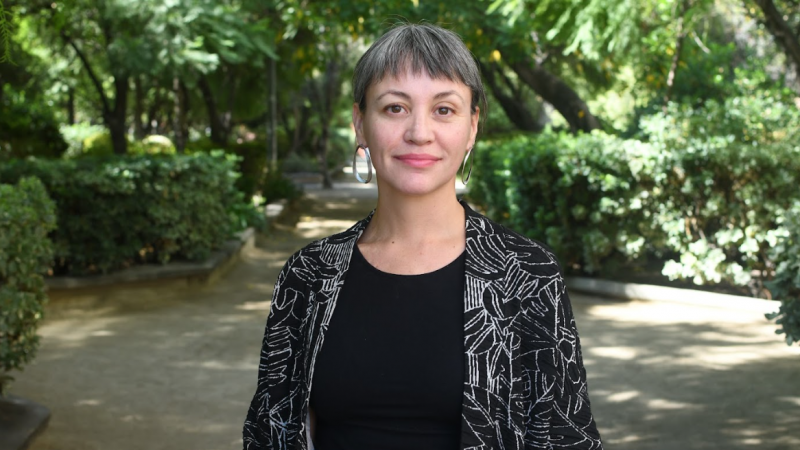
La académica refuerza el equipo del ESOC con una destacada trayectoria en estudios sobre migración, envejecimiento, diversidad y convivencia urbana, con un fuerte enfoque en el impacto social y en políticas públicas. La Universidad Central de Chile da la bienvenida a la investigadora Carolina Ramírez, quien se une al Centro de Investigación en Economía y Sociedad (ESOC), dependiente de la Vicerrectoría de Investigación, Innovación y Postgrado. Su incorporación busca potenciar las capacidades del Centro en áreas de investigación interdisciplinaria, aportando desde una agenda consolidada que cruza migración, envejecimiento, trabajo informal y dinámicas urbanas. “Mis investigaciones han abordado procesos como la formación de barrios comerciales étnicamente diversos, trayectorias laborales precarias de personas migrantes, crisis de la reproducción social en contextos migratorios, trabajo informal migrante, entre otros procesos que espero me permitan participar en diferentes conversaciones”, explicó la investigadora. “Una oportunidad para fortalecer el trabajo colaborativo” Para Carolina Ramírez, integrarse al ESOC representa una plataforma para continuar impulsando su enfoque interdisciplinario. “Incorporarme al ESOC representa una oportunidad para seguir fortaleciendo mi trabajo interdisciplinario y colaborativo”, señaló. Su experiencia cruza los estudios migratorios, urbanos y de envejecimiento, lo que le permitirá vincular la investigación con la docencia y la extensión universitaria. “Espero desarrollar instancias de colaboración a través de la docencia, la investigación y la vinculación con el medio”, agregó. Con una trayectoria respaldada por fondos nacionales e internacionales, incluyendo la Agencia Nacional de Investigación y Desarrollo (ANID), Ramírez también contribuirá a ampliar la proyección internacional del ESOC, consolidando redes de trabajo y agendas comunes con equipos de otros países. Investigación sobre migración y envejecimiento Su línea de investigación ha evolucionado desde el estudio de la migración hacia un enfoque que vincula este fenómeno con el envejecimiento. En este contexto, ha explorado la convivencia entre diferentes cohortes migratorias y etarias, así como las experiencias del envejecimiento en países de destino. En esa línea, recientemente se adjudicó un proyecto FONDECYT Regular que estudia la vida de mujeres migrantes peruanas de mediana edad avanzada y mayores, asentadas en Chile desde las décadas de 1990 y 2000. “El estudio profundizará en sus trayectorias de vida, relaciones sociales transnacionales, sentidos de pertenencia y visiones de futuro”, explicó. “Para ello, se considerará el impacto de las desigualdades estructurales y los cambios en los regímenes migratorios”. Impacto en políticas públicas y nuevas áreas de investigación Uno de los objetivos de su trabajo es establecer un vínculo directo con las políticas públicas. Particularmente, apunta a las condiciones laborales precarizadas de las personas migrantes mayores y a los desafíos que enfrentan para acceder a sistemas de protección social. Ramírez subraya la necesidad de políticas interseccionales que respondan a estas realidades, considerando las múltiples barreras que enfrentan especialmente las mujeres migrantes mayores. Entre los temas que proyecta para futuras investigaciones en el país, destaca el retorno de personas migrantes mayores a sus países de origen, las estrategias que desarrollan para dicho proceso, la “generación cero” (padres de migrantes adultos que migran para vivir con ellos) y la circulación de cuidados en contextos de envejecimiento y migración. Una metodología innovadora Doctora en Sociología Visual, Carolina Ramírez se ha destacado por incorporar enfoques metodológicos innovadores en sus investigaciones. Ha utilizado técnicas como el “fotovoz”, que permite a los participantes documentar visualmente sus experiencias, así como el análisis de archivos fotográficos históricos y etnografías visuales. Esta perspectiva metodológica no solo genera conocimiento académico, sino que también promueve instancias de diálogo con la sociedad. Proyecciones a futuro Con un enfoque claro en la investigación aplicada, Ramírez apuesta por seguir profundizando en la relación entre migración y envejecimiento, particularmente en el contexto chileno, donde convergen el envejecimiento poblacional acelerado y el creciente rol del país como destino migratorio. “Es crucial visibilizar la diversidad de la población migrante y de la población mayor, así como su protagonismo en la sociedad”, concluyó.
ESOC inicia nueva etapa con foco en excelencia académica y proyección social
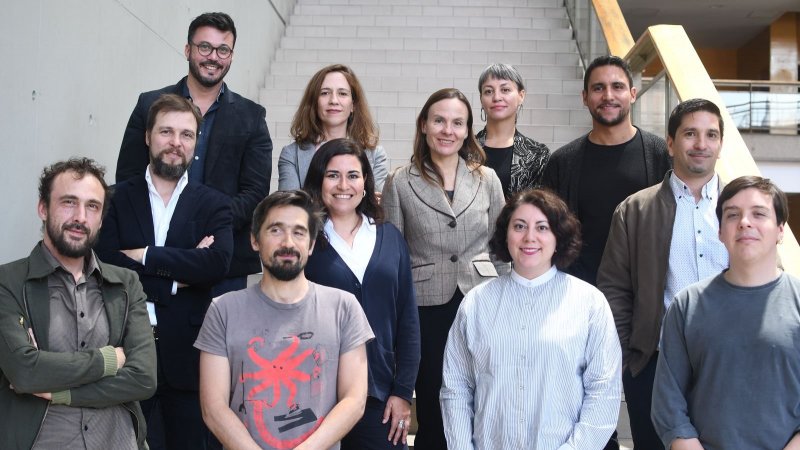
El Centro de Investigación en Economía y Sociedad (ESOC) de la Universidad Central inicia una nueva etapa marcada por la renovación de su liderazgo y una visión estratégica orientada a fortalecer su impacto académico, social y en políticas públicas. Desde marzo, la profesora Paz Concha asumió la dirección del Centro con el objetivo de consolidarlo como un referente en las ciencias sociales aplicadas. Con una sólida trayectoria en investigación y gestión académica, Concha asumió el desafío con clara convicción: “Es una gran oportunidad para apoyar a mis colegas, impulsar sus carreras y contribuir al cumplimiento de los objetivos institucionales de investigación de excelencia”, señaló. Su gestión buscará ampliar la visibilidad del ESOC, fomentar redes de colaboración y posicionar sus investigaciones en el centro del debate económico y social del país. Actualmente, el Centro desarrolla estudios en áreas prioritarias como migración, convivencia social, sistema de admisión escolar, economía circular, desigualdad de oportunidades y el rol del Banco Central, entre otros. A través de estos proyectos, el ESOC se ha consolidado como un espacio de generación de conocimiento con fuerte vocación pública, tendiendo puentes entre el mundo académico y la ciudadanía mediante actividades abiertas y espacios de formación. La internacionalización también es uno de los pilares del Centro. Entre sus alianzas estratégicas se encuentran el Max Planck Institute for the Study of Societies (Alemania) y su participación en redes nacionales como el Centro de Estudios de Conflicto y Cohesión Social (COES). “Queremos seguir expandiendo nuestras redes y generar nuevas alianzas que fortalezcan nuestra labor”, afirmó la directora. Uno de los sellos distintivos del ESOC es la incorporación activa de estudiantes en sus líneas de trabajo, ya sea como tesistas o asistentes de investigación. Esta práctica no solo enriquece la experiencia formativa del estudiantado, sino que también refuerza el compromiso del Centro con el conocimiento aplicado y pertinente. De cara a 2025, el equipo del ESOC ya trabaja en una hoja de ruta que permita proyectar su crecimiento, adjudicar nuevos fondos de financiamiento y robustecer sus publicaciones científicas. Con esta nueva etapa, el Centro busca consolidarse como un actor clave en la reflexión, investigación y transformación de los desafíos sociales y económicos del país.
Doctorado en Estudios Sociales Avanzados avanza hacia la acreditación con la entrega final de su informe de autoevaluación

En el marco del proceso de acreditación ante la Comisión Nacional de Acreditación (CNA), el Doctorado en Estudios Sociales Avanzados continúa avanzando con firmeza en el cumplimiento de los hitos que exige esta importante instancia de evaluación de calidad. En esta línea, el programa realizó su tercera reunión de claustro del año 2025, ocasión en la que se socializó y discutió el plan de mejoras elaborado a partir de la visita simulada de pares evaluadores desarrollada en enero. Este encuentro constituyó una instancia clave en la etapa final de elaboración del informe de autoevaluación, cuya entrega a la CNA está prevista para fines de marzo. Durante la jornada, se presentaron los principales lineamientos del plan de mejoras, que recoge las recomendaciones formuladas por los evaluadores externos, quienes destacaron positivamente el estado del programa, sugiriendo ajustes menores e identificando oportunidades de fortalecimiento, particularmente en ámbitos como la internacionalización y la optimización de ciertos procesos internos. Cabe destacar que el informe de autoevaluación ha sido fruto de un trabajo sostenido a lo largo de todo el año 2024, periodo en el que el claustro académico del programa se abocó a una revisión sistemática y participativa de sus componentes estructurales y de gestión. La simulación de evaluación realizada en enero de 2025 permitió contrastar dicho trabajo con estándares externos, enriqueciendo así el documento final con aportes críticos y constructivos. En la reunión participaron académicos e investigadores del claustro: Gabriel Chouhy, Paz Concha, Ismael Puga, Valeria Scapini, Ignacio Schiappacasse, Felipe González, Herminia Gonzalvez, Héctor Ríos, Diego Velásquez, Jorge Moraga y Gabriela Zapata, junto con los estudiantes Jorge Vásquez y Liz Zárate, pertenecientes a la primera cohorte del programa. La presencia de estudiantes en esta instancia permitió incorporar sus miradas en el diseño de estrategias orientadas al fortalecimiento del doctorado, tales como ajustes curriculares, mejora en los procesos de selección e integración, y el fortalecimiento de la experiencia formativa. Con estos avances, el Doctorado en Estudios Sociales Avanzados reafirma su compromiso con la mejora continua y la excelencia académica, asegurando que su desarrollo institucional se mantenga alineado con los más altos estándares de calidad requeridos para su acreditación.
Ignacio Schiappacasse, académico de la FEGOC, participó en la II Conferencia Chilena de Redes Sociales
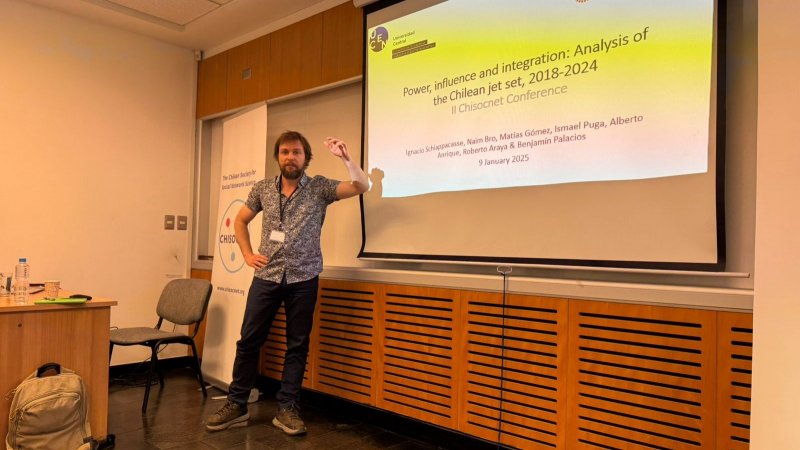
En la instancia, el también investigador del centro de investigación de Economía y Sociedad, ESOC, presentó el estudio que analiza la estructura social de la élite chilena entre 2018 y 2024, destacando las relaciones de poder, influencia y conexión en la red social de personalidades clave del país. En el evento, el profesor Schiappacasse presentó el trabajo titulado “Power, influence and integration: Analysis of the Chilean jet set, 2018-2024” durante la sesión “Educational and economic networks”, realizada el jueves 9. El estudio, que analiza la estructura social de la élite chilena a partir de las apariciones en las páginas de Vida Social del periódico El Mercurio entre 2018 y 2024, identifica los nodos más influyentes y los actores que funcionan como puentes en la conexión de distintos grupos. “Estamos muy contentos, como equipo, con esta presentación porque representa un primer avance de nuestro proyecto Fondecyt de Iniciación. En este proyecto estamos intentando comprender las relaciones de poder en las que está inserto el Banco Central de Chile y las implicancias de estas dinámicas de poder para la autonomía del mismo Banco”, indicó Schiappacasse. Este proyecto es liderado por el profesor Schiappacasse y cuenta con la colaboración de destacados investigadores de la Universidad Central, como Ismael Pulgar, director del Doctorado en Estudios Sociales Avanzados; Matías Gómez, director del Laboratorio de Conversación Pública; y Alberto Anrique, investigador joven del ESOC. Además, el equipo incluye a Naim Bro, especialista en redes sociales de la Universidad Adolfo Ibáñez (UAI); Roberto Araya, estudiante de doctorado en Procesos e Instituciones Políticas de la UAI; y Benjamín Palacios, investigador joven de la misma universidad. Durante la conferencia, también se presentaron los primeros resultados del proyecto Fondecyt Iniciación “Opening the Black Box: Exploring the role of elite networks in the Central Bank of Chile’s decision-making” (Nro. 11240730), financiado por la Agencia Nacional de Investigación y Desarrollo (ANID). Este evento no solo permitió mostrar avances en el análisis de redes sociales aplicadas a las ciencias sociales, sino también fortalecer vínculos con investigadores nacionales e internacionales, contribuyendo al posicionamiento de la FEGOC y la Universidad Central como referentes en la producción académica de excelencia.
Investigadores del ESOC se adjudican dos proyectos Fondecyt en distintas categorías
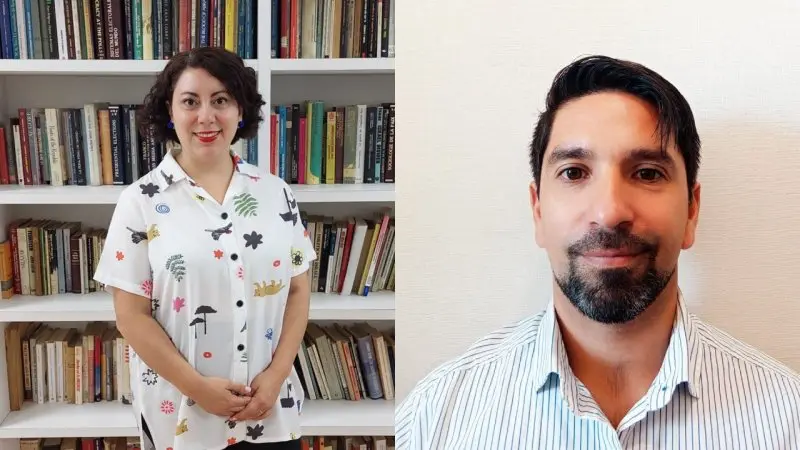
Un proyecto sobre economía circular en la industria textil y otro sobre el impacto del cambio climático en el trabajo resaltan la excelencia investigativa de la Facultad de Economía, Gobierno y Comunicaciones de la Universidad Central. La Facultad de Economía, Gobierno y Comunicaciones (FEGOC) de la Universidad Central celebra un importante logro: dos investigadores del Centro de Investigación de Economía y Sociedad (ESOC) se adjudicaron Fondecyt en las categorías Iniciación y Postdoctorado. El primero de los proyectos, liderado por la Dr. Paz Concha, también directora del Núcleo de Autonomías de Género (NIAG) de la UCEN, tiene como título “Comprendiendo el valor en la economía circular: el caso de la industria textil en Chile”, y fue adjudicado en la categoría Fondecyt de Iniciación. Su objetivo es analizar las narrativas y performances de valor asociadas a la economía circular en el sector textil, considerando la perspectiva de organismos gubernamentales, organizaciones no gubernamentales y empresas en Santiago e Iquique. “Me encuentro con mucho entusiasmo para iniciar este proyecto. Lo postulé dos veces y el apoyo de mis compañeros de Esoc fue invaluable para mejorar mi postulación y llegar a la adjudicación. Va a ser un desafío importante tener equipo y poder hacer trabajo de campo en Iquique y Santiago. Se viene bastante trabajo, pero del bueno, que espero sea un aporte para la discusión sobre los aspectos económicos y culturales de la economía circular y la sustentabilidad” indicó la investigadora. Por su parte, Diego Velásquez, Sociólogo y doctor en Geografía, se adjudicó un Fondecyt de Postdoctorado con su proyecto “Cambio climático y trabajo: Estrategias de los trabajadores para mitigar y adaptarse a la crisis”. La investigación se centra en las estrategias que los trabajadores desarrollan para influir en las decisiones sobre mitigación y adaptación al cambio climático en Chile, en sectores vulnerables como minería, pesca, acuicultura y silvoagricultura. “Haberme adjudicado uno de estos fondos me pone muy feliz, la verdad es un concurso bastante competitivo, pero creo que el tema de investigación, particularmente el tema del cambio climático, es un área prioritaria a nivel nacional, pero también global, es como el tema que está en boga, y creo que eso resultó ser atractivo para los evaluadores, y bueno, me pone muy contento también poder contribuir en ello, especialmente a través del estudio de las acciones de los trabajadores, porque son ellos quienes van a recibir principalmente los efectos del cambio climático en sus puestos de trabajo, pero también juegan un rol clave a la hora de definir las políticas de mitigación”, expresó el sociólogo. Velásquez detalló que la investigación comenzará con una revisión de literatura para profundizar en las discusiones globales sobre el tema, y posteriormente avanzará hacia el trabajo en terreno, utilizando entrevistas y otras fuentes de investigación. Con una duración de tres años, el proyecto permitirá desarrollar un análisis exhaustivo y aportar nuevas perspectivas sobre las estrategias laborales frente al cambio climático. Estos reconocimientos destacan no solo la calidad y profundidad de las investigaciones lideradas por el ESOC, sino también su compromiso con temáticas críticas para el futuro económico, ambiental y social del país. Los proyectos adjudicados abren nuevas oportunidades para fortalecer el impacto de la Facultad en el debate académico y en la generación de propuestas que contribuyan al desarrollo sostenible de Chile.
Núcleo de Autonomías de Género llevó a cabo su tercer seminario

El espacio contó con la charla “Geografía de los cuidados de personas mayores: un análisis espacial de la oferta y demanda de cuidados formales”, por la investigadora Bárbara Flores. Como parte de las acciones comprometidas del Núcleo de Autonomías de Género (NIAG) de la Universidad Central, se realizó el tercer seminario, que consistió de una interesante presentación y un espacio de reflexión entre quienes asistieron. La invitada fue Bárbara Flores, Investigadora Principal del Centro de Economía y Políticas Sociales de la Universidad Mayor, quien presentó su trabajo “Geografía de los cuidados de personas mayores: un análisis espacial de la oferta y demanda de cuidados formales”. La presentación expuso algunos de los resultados del estudio, graficando cómo se distribuye la población mayor por región en nuestro país, cruzándola con donde se ubican aquellos servicios enfocados en su cuidado, revisando así la disponibilidad y cercanía de los mismos. Fue así como se reveló que en las áreas rurales o zonas periféricas casi no hay oferta de estos servicios. El evento contó con la participación de diversas investigadoras de la Universidad Central, que pudieron presenciar algunos de los resultados del estudio, además de reflexionar sobre otras variables que son posibles cruzar en la temática de personas mayores y la oferta de cuidados. Además, la presentadora afirmó que para abordar esta problemática es necesario considerar la dimensión territorial. Paz Concha, directora del NIAG, comentó que: “Tuvimos una excelente presentación de Bárbara Flores que nos iluminó acerca de la distribución regional de las necesidades de cuidado de personas mayores”. Además, agregó que con la exposición “se evidencia que -la dimensión territorial- puede tener un gran impacto en la toma de decisiones, especialmente en el contexto actual de crisis de los cuidados que estamos experimentando”.
Investigador del ESOC, Ignacio Schiappacasse, presentó su trabajo sobre fuentes ideacionales de poder en el VIII CLADHE en Montevideo
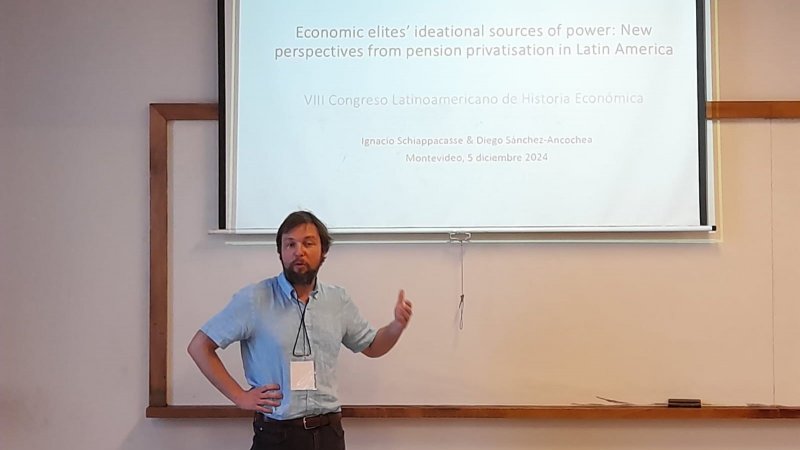
El académico de la Universidad Central participó en el prestigioso congreso que reúne a destacados investigadores de la historia económica latinoamericana. El investigador del ESOC y académico de la Facultad de Economía, Gobierno y Comunicaciones de la Universidad Central, Ignacio Schiappacasse, participó en el VIII Congreso Latinoamericano de Historia Económica (VIII CLADHE), realizado en la Universidad de la República, Montevideo, Uruguay. Durante este evento, Schiappacasse presentó el trabajo titulado “Business’s Ideational Sources of Power: A New Perspective from Latin America”, una investigación en coautoría con Diego Sánchez-Ancochea, académico del Departamento de Desarrollo Internacional de la Universidad de Oxford. El CLADHE, organizado por la Asociación Uruguaya de Historia Económica (AUDHE), se celebra cada dos años y reúne a destacados investigadores en el campo de la historia económica de América Latina. En esta ocasión, el congreso contó con 44 simposios que abordaron una amplia gama de temas, desde la historia agraria hasta la evolución de la estructura económica de la región. Schiappacasse participó en el simposio “Clases, élites y poder económico en América Latina”, donde discutió el impacto de las ideas y el poder empresarial en la dinámica económica de la región. El evento, que busca establecer redes de trabajo entre académicos de toda Iberoamérica, ofreció a los asistentes la oportunidad de conectar con colegas que investigan temas similares, intercambiar conocimientos y recibir valiosos comentarios sobre sus proyectos. Schiappacasse destacó la importancia del congreso como un espacio de aprendizaje y colaboración que contribuye a consolidar la investigación en su universidad y a mejorar la productividad académica. Con un enfoque interdisciplinario, el VIII CLADHE propició un diálogo enriquecedor entre los investigadores enfocados en la historia económica en América Latina, donde también se abordaron las perspectivas globales y comparativas con otras regiones. La próxima edición del congreso se celebrará en México en 2026, prometiendo ser otro punto de encuentro clave para el avance de la historia económica en América Latina.
Seminar Program “Social studies of debt and financial technologies in Chile”.

Date:Wednesday, September 27, 2023. Venue: Research and Postgraduate Research Institute, School of Economics, Government and Communications, Universidad Central. Santa Isabel 1278, Room 67, VKII building. Organizers: Felipe González (Universidad Central de Chile) & José Ossandón (Copenhagen Business School). Event developed in the context of a collaboration between the Max Planck – UCEN Group for Research in Economics and Society and the project “Post-pandemic Poverty: Debt and the Feminisation of Finance in Marginal Sites”, funded by the Independent Research Fund Denmark. Program and abstracts Registration here. Program 8.30 Welcome coffee 9.00 – 10:30. First session – And what else can I do? If you can no longer spend less. Strategies of middle-income households in Chile to cope with inflation. Lorena Pérez Roa (Social Work, Universidad de Chile), Alejandro Marambio Tapia (Sociology, Universidad Católica del Maule) and Gabriela Azocar de la Cruz (Social Work, Universidad de Chile). – The debt of others: towards a sociological exploration of attitudes and perceptions about the use of credit from relationship networks and reference groups. Matías Gómez (Sociology P. Universidad Católica & Research Institute of Economics, Government and Communications, Universidad Central) 10:30 Coffee break 11:00 – 12:30. Second session – Financial oikonomization: the financial government and administration of the household. José Ossandón (Department of Organization, Copenhagen Business School), Joe Deville (Department of Organisation, Work and Technology and the Department of Sociology, Lancaster University), Jeanne Lazarus (Centre de sociologie des Organisations, Sciences-Po-CNRS), Mariana Luzzi (Escuela Interdisciplinaria de Altos Estudios Sociales, Universidad Nacional de San Martín, CONICET) (Presentation in Spanish) – Entrepreneurship as therapy: learning to fail and care through micro-entrepreneurship in Santiago, Chile. Piergiorgio Di Giminiani (Anthropology, P. Universidad Católica de Chile) and Constanza Quezada (Anthropology, Pontificia Universidad Católica de Chile) 12:30 Lunch 13:00 – 14:30. Third session – “Papito corazón”: exploring the economic disadvantages of being head of household of popular sectors in Santiago, Chile. Lorena Pérez Roa (Social Work, Universidad de Chile) and Rocío Gallardo (Social Work, Universidad de Chile). – Consumer credit and personal networks. Exploring the role of network socioeconomic heterogeneity in consumption and indebtedness. Felipe González (Grupo Max Planck – UCEN de Investigación en Economía y Sociedad, Instituto de Investigación de Economía, Gobierno y Comunicaciones, Universidad Central), Gabriel Otero (Grupo Max Planck – UCEN de Investigación en Economía y Sociedad, Instituto de Investigación de Economía, Gobierno y Comunicaciones, Universidad Central), Matías Gómez ((Grupo Max Planck – UCEN de Investigación en Economía y Sociedad, Instituto de Investigación de Economía, Gobierno y Comunicaciones, Universidad Central & Sociología, P. Universidad Católica). 15:00 Closing and social activity


 600 582 2222
600 582 2222  admision@ucentral.cl
admision@ucentral.cl